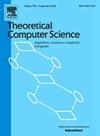异步易崩溃系统中的自稳定多值共识
IF 0.9
4区 计算机科学
Q3 COMPUTER SCIENCE, THEORY & METHODS
引用次数: 0
摘要
多值共识问题是容错分布式计算中的一个基本问题。它包含一系列广泛的协议问题,在这些问题中,进程必须一致决定一个特定值 v∈V,且 |V|≥2。处理进程崩溃故障的现有解决方案将多值共识问题简化为二值共识问题。这种解决方案的例子包括 Mostéfaoui-Raynal-Tronel [IPL 2000] 和 Zhang-Chen [IPL 2009]。在这项工作中,我们的目标是利用自稳定的概念,设计一种更可靠的解决方案,它提供了一种强大的容错形式。自稳定算法可以从瞬态故障中恢复,而瞬态故障是指任何偏离系统预期行为的情况(只要算法代码保持不变),此外还包括进程和通信故障。据我们所知,这项研究首次提出了在易受进程故障和瞬态故障影响的异步消息传递系统中实现多值共识的自稳定算法。我们的解决方案最多需要同时调用 n 次二进制共识。与之前的非自稳定解决方案相比,这是我们推进最先进解决方案的另一种方式。例如,Mostéfaoui-Raynal-Tronel 的解决方案需要无限制地连续调用二进制共识。本文章由计算机程序翻译,如有差异,请以英文原文为准。
Self-stabilizing multivalued consensus in asynchronous crash-prone systems
The multivalued consensus problem is a fundamental issue in fault-tolerant distributed computing. It encompasses a wide range of agreement problems where processes must unanimously decide on a specific value , with . Existing solutions that handle process crash failures simplify the multivalued consensus problem by reducing it to the binary consensus problem. Examples of such solutions include Mostéfaoui-Raynal-Tronel [IPL 2000] and Zhang-Chen [IPL 2009].
In this work, we aim to design an even more reliable solution by leveraging the concept of self-stabilization, which provides a strong form of fault tolerance. Self-stabilizing algorithms can recover from transient faults, which represent any deviation from the system's intended behavior (as long as the algorithm code remains intact) in addition to process and communication failures.
To the best of our knowledge, this work presents the first self-stabilizing algorithm for multivalued consensus in asynchronous message-passing systems susceptible to process failures and transient faults. Our solution uses, at most, n concurrent invocations of binary consensus. This is another way we advance state-of-the-art solutions compared to previous non-self-stabilizing ones. For example, Mostéfaoui-Raynal-Tronel's solution requires an unbounded number of sequential invocations of binary consensus.
求助全文
通过发布文献求助,成功后即可免费获取论文全文。
去求助
来源期刊

Theoretical Computer Science
工程技术-计算机:理论方法
CiteScore
2.60
自引率
18.20%
发文量
471
审稿时长
12.6 months
期刊介绍:
Theoretical Computer Science is mathematical and abstract in spirit, but it derives its motivation from practical and everyday computation. Its aim is to understand the nature of computation and, as a consequence of this understanding, provide more efficient methodologies. All papers introducing or studying mathematical, logic and formal concepts and methods are welcome, provided that their motivation is clearly drawn from the field of computing.
 求助内容:
求助内容: 应助结果提醒方式:
应助结果提醒方式:


